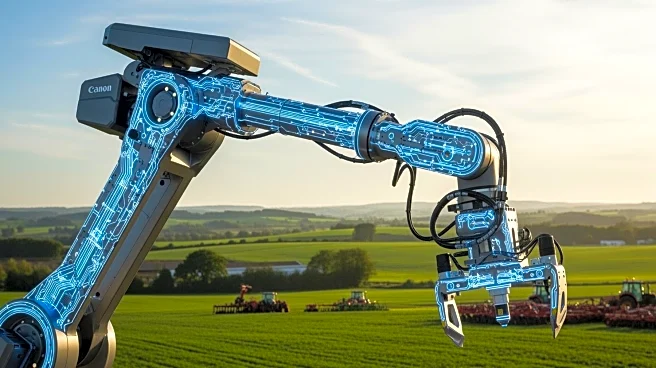What's Happening?
The agricultural equipment market is experiencing significant changes due to increased adoption of precision agriculture and sustainability initiatives. Recent U.S. regulations are incentivizing eco-friendly farming equipment, which is reshaping industry
competition and sustainability standards. Major players like John Deere are at the forefront of this shift, with their investment narrative increasingly focused on tech-enabled, sustainable agriculture. Deere's recent launch of the Operations Center PRO Service aligns with regulatory pushes for smarter, efficient equipment, enhancing diagnostics for both connected and non-connected machinery. Despite these advancements, Deere faces challenges such as margin pressure from tariffs and volatility in the North American market, which remains a critical short-term catalyst and risk.
Why It's Important?
The shift towards sustainable and tech-enabled agriculture is crucial for the future of farming, as it promises to enhance productivity while reducing environmental impact. For companies like Deere, this trend offers opportunities to innovate and develop higher-margin products. However, the volatility in the North American market and margin pressures pose significant risks. The increased regulatory incentives for eco-friendly equipment could drive demand for Deere's advanced machinery, potentially boosting their revenue and earnings. This transformation in the agricultural equipment market could lead to long-term benefits for the industry, promoting sustainable practices and technological advancements.
What's Next?
Deere's outlook anticipates revenue of $45.1 billion and earnings of $8.6 billion by 2028, reflecting a projected annual revenue decline of 0.7% but an earnings increase of $3.4 billion from current earnings. Investors will be closely monitoring how Deere navigates the challenges posed by market volatility and margin pressures. The company's ability to leverage regulatory incentives and technological advancements will be key to its future success. Stakeholders in the agricultural sector may respond by increasing investments in sustainable technologies, further driving innovation and competition.
Beyond the Headlines
The broader implications of this shift towards sustainable farming include potential changes in agricultural practices and policies. As companies like Deere lead the way in tech-enabled agriculture, there may be increased pressure on smaller players to adopt similar practices, potentially leading to industry consolidation. Additionally, the focus on sustainability could influence consumer preferences, driving demand for eco-friendly products and practices. This transformation may also impact global agricultural trade, as countries adopt varying standards and regulations.















